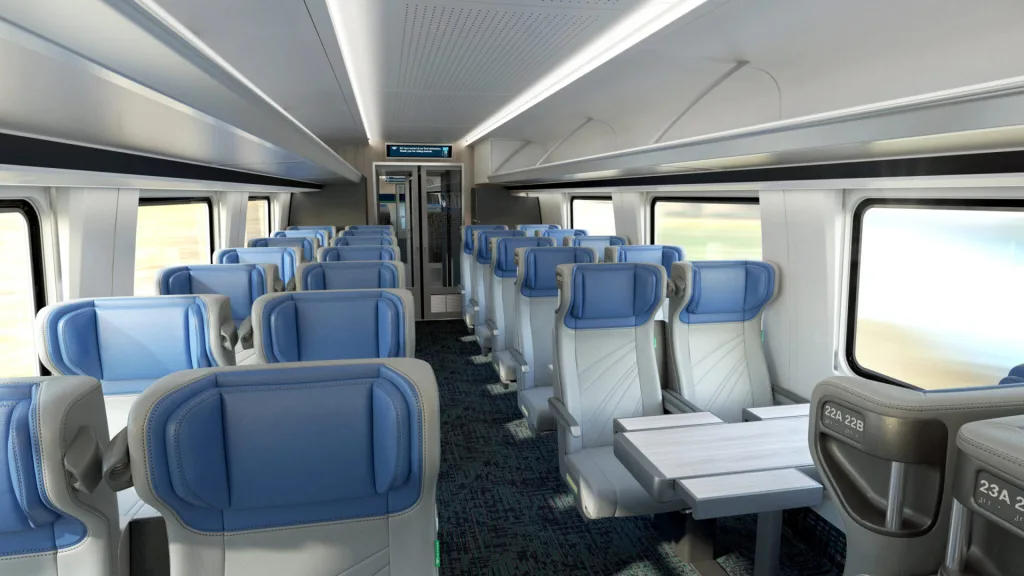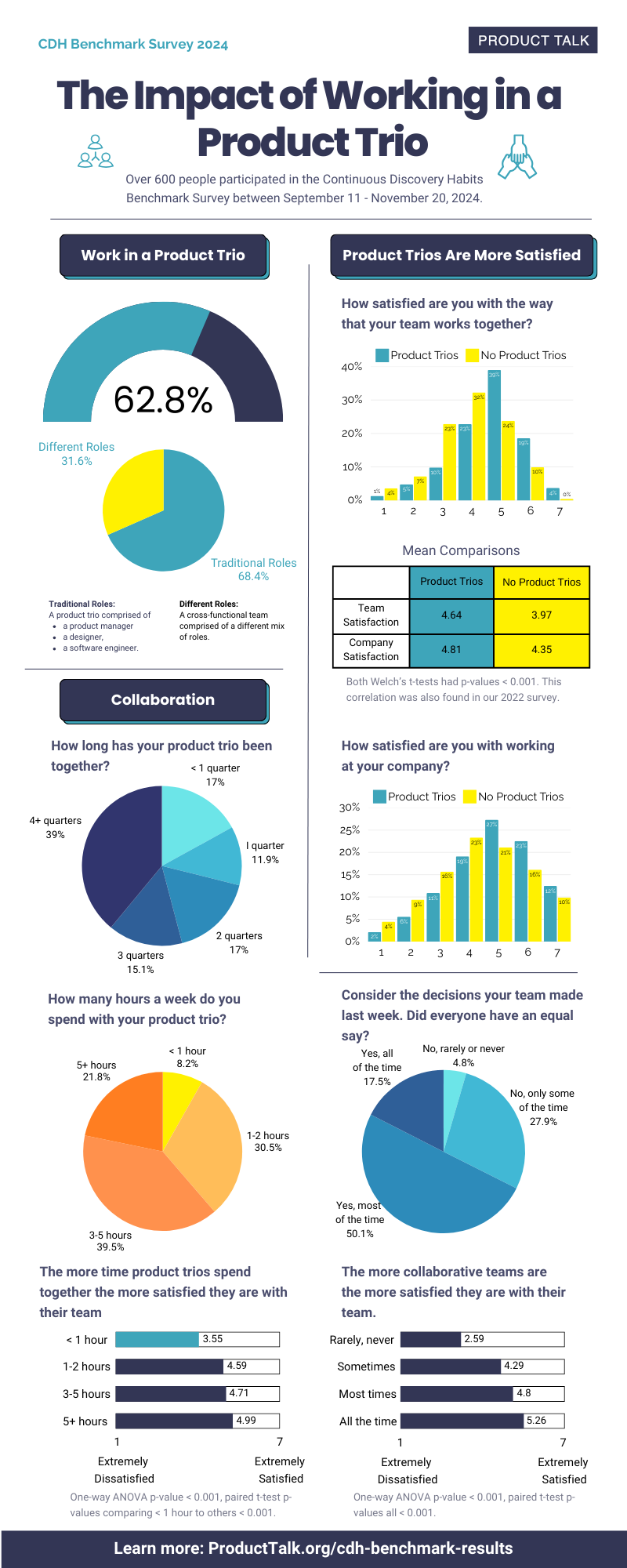Amtrak’s new trains will have bigger windows, comfier seats, and higher speeds
Amtrak has revealed a first look at its new Airo trains, and they come with panoramic windows, comfier chairs, and more accessibility features. The national rail service is currently constructing 83 of the new-and-improved Airo trains, which will operate on around 15 existing routes in the Eastern U.S. and Pacific Northwest. According to a spokesperson, the Airo manufacturing is currently underway at Siemens’s Sacramento plant, with testing of the first trains expected to begin in the second half of this year. By modernizing its fleet with a variety of design improvements, Amtrak is making a play to attract more Americans to train travel instead of flight—a step toward its ultimate goal to revitalize America’s passenger rail system and double ridership by 2040. [Image: Amtrak] Nicer seats, bigger views In an announcement released earlier this month, Amtrak revealed a first look at the specs and interiors of its Airo design, and they’re a marked improvement to the rail service’s existing models. On the inside, new seating offers moveable headrests, a cupholder, bigger and sturdier tray tables, and “plenty of legroom,” per the release. Panoramic windows have been added to let in plenty of light and allow travelers to take in the passing views. And, to make finding your seat simpler, each car will be color-coded based on its class, while each chair will be labeled with an individual number. [Image: Amtrak] More thought has also been given to the trains’ amenities. In the Airo’s cafe cars, riders will now have a self-service option rather than waiting in one long line to order from a single attendant. The cafe car—as well as the bathrooms, walkways, and vestibules—has also been modified to allow wheelchair users to navigate more easily. Aesthetically, the Airo’s staid gray and blue interiors are still lagging far behind the train designs one might find overseas—like in France’s high-speed TGV Inoui model, which looks like a ‘70s space age mood board. Still, the Airo represents a technological improvement on former Amtrak models in that it can travel up to 125 mph and “produces 90% less particulate emissions in diesel operations.” Fast Company reached out to Amtrak for more details on the Airo’s design and environmental impact, and the rail service declined to provide further information at this time. [Image: Amtrak] It’s a good time for Amtrak to be investing in new trains, given that some of its old cars are going out of service: Just last week, the rail service announced that it would be suspending its entire Horizon fleet after inspectors uncovered potentially dangerous corrosion on several cars. [Image: Amtrak] Amtrak’s plan to revitalize America’s rail system The Airo trains, slated to hit tracks in 2026, are the first phase of Amtrak’s larger plans to refresh its existing fleet and expand its service across the U.S. Last February, former Amtrak CEO Stephen Gardner told Fast Company that the U.S. is essentially still operating “Victorian railways” in the 21st century. Meanwhile countries like France, Japan, Switzerland, and China are moving light-years ahead in terms of their high-speed rail systems (the closest the U.S. has come to high-speed rail is Amtrak’s Acela route). Amtrak has been working to bring the country’s rail system into the modern era by expanding its routes, enticing younger customers, and, of course, upgrading its trains. So far, its efforts seem to be paying off. In 2024, Amtrak saw a record ridership of 32.8 million passengers, up from 28 million the year before. The rail service’s ultimate goal is to see 66 million riders by 2040. As Amtrak works to achieve that benchmark, some critics—including Elon Musk—have called for the service to be privatized. However, as Fast Company has previously written, such a move could derail the provider’s expansion plans by raising prices for consumers and even eliminating less profitable routes. In the meantime, if Amtrak is allowed to continue operating under its current structure, a spokesperson predicted that the service is “on track to reach operational profitability—for the first time in history—during this administration.”

Amtrak has revealed a first look at its new Airo trains, and they come with panoramic windows, comfier chairs, and more accessibility features.
The national rail service is currently constructing 83 of the new-and-improved Airo trains, which will operate on around 15 existing routes in the Eastern U.S. and Pacific Northwest. According to a spokesperson, the Airo manufacturing is currently underway at Siemens’s Sacramento plant, with testing of the first trains expected to begin in the second half of this year.
By modernizing its fleet with a variety of design improvements, Amtrak is making a play to attract more Americans to train travel instead of flight—a step toward its ultimate goal to revitalize America’s passenger rail system and double ridership by 2040.

Nicer seats, bigger views
In an announcement released earlier this month, Amtrak revealed a first look at the specs and interiors of its Airo design, and they’re a marked improvement to the rail service’s existing models.
On the inside, new seating offers moveable headrests, a cupholder, bigger and sturdier tray tables, and “plenty of legroom,” per the release. Panoramic windows have been added to let in plenty of light and allow travelers to take in the passing views. And, to make finding your seat simpler, each car will be color-coded based on its class, while each chair will be labeled with an individual number.

More thought has also been given to the trains’ amenities. In the Airo’s cafe cars, riders will now have a self-service option rather than waiting in one long line to order from a single attendant. The cafe car—as well as the bathrooms, walkways, and vestibules—has also been modified to allow wheelchair users to navigate more easily.
Aesthetically, the Airo’s staid gray and blue interiors are still lagging far behind the train designs one might find overseas—like in France’s high-speed TGV Inoui model, which looks like a ‘70s space age mood board. Still, the Airo represents a technological improvement on former Amtrak models in that it can travel up to 125 mph and “produces 90% less particulate emissions in diesel operations.” Fast Company reached out to Amtrak for more details on the Airo’s design and environmental impact, and the rail service declined to provide further information at this time.

It’s a good time for Amtrak to be investing in new trains, given that some of its old cars are going out of service: Just last week, the rail service announced that it would be suspending its entire Horizon fleet after inspectors uncovered potentially dangerous corrosion on several cars.

Amtrak’s plan to revitalize America’s rail system
The Airo trains, slated to hit tracks in 2026, are the first phase of Amtrak’s larger plans to refresh its existing fleet and expand its service across the U.S.
Last February, former Amtrak CEO Stephen Gardner told Fast Company that the U.S. is essentially still operating “Victorian railways” in the 21st century. Meanwhile countries like France, Japan, Switzerland, and China are moving light-years ahead in terms of their high-speed rail systems (the closest the U.S. has come to high-speed rail is Amtrak’s Acela route). Amtrak has been working to bring the country’s rail system into the modern era by expanding its routes, enticing younger customers, and, of course, upgrading its trains.
So far, its efforts seem to be paying off. In 2024, Amtrak saw a record ridership of 32.8 million passengers, up from 28 million the year before. The rail service’s ultimate goal is to see 66 million riders by 2040. As Amtrak works to achieve that benchmark, some critics—including Elon Musk—have called for the service to be privatized. However, as Fast Company has previously written, such a move could derail the provider’s expansion plans by raising prices for consumers and even eliminating less profitable routes.
In the meantime, if Amtrak is allowed to continue operating under its current structure, a spokesperson predicted that the service is “on track to reach operational profitability—for the first time in history—during this administration.”





























































































![Building A Digital PR Strategy: 10 Essential Steps for Beginners [With Examples]](https://buzzsumo.com/wp-content/uploads/2023/09/Building-A-Digital-PR-Strategy-10-Essential-Steps-for-Beginners-With-Examples-bblog-masthead.jpg)



![How One Brand Solved the Marketing Attribution Puzzle [Video]](https://contentmarketinginstitute.com/wp-content/uploads/2025/03/marketing-attribution-model-600x338.png?#)





![How to Use GA4 to Track Social Media Traffic: 6 Questions, Answers and Insights [VIDEO]](https://www.orbitmedia.com/wp-content/uploads/2023/06/ab-testing.png)








![[Hybrid] Graphic Designer in Malaysia](https://a5.behance.net/920d3ca46151f30e69b60159b53d15e34fb20338/img/site/generic-share.png)























